#radiotelevisione italiana
Photo
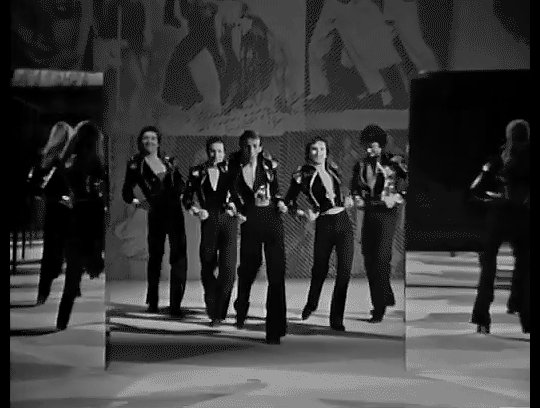
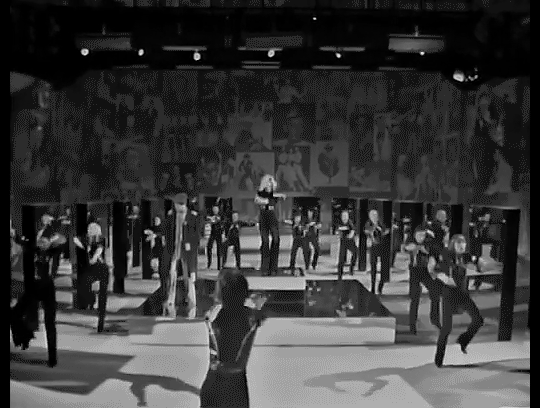

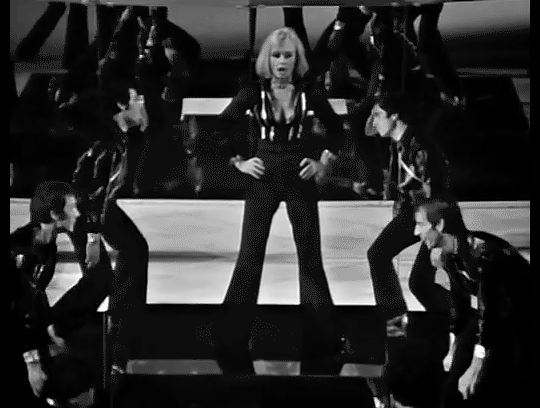
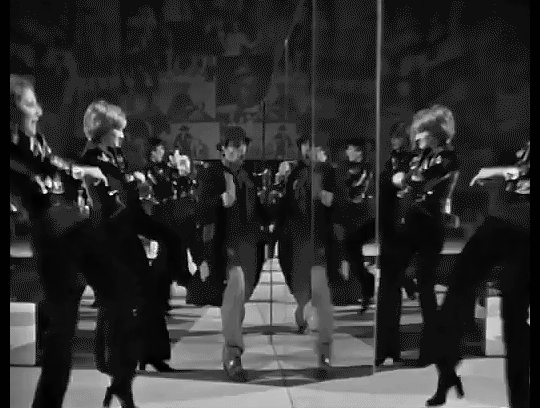
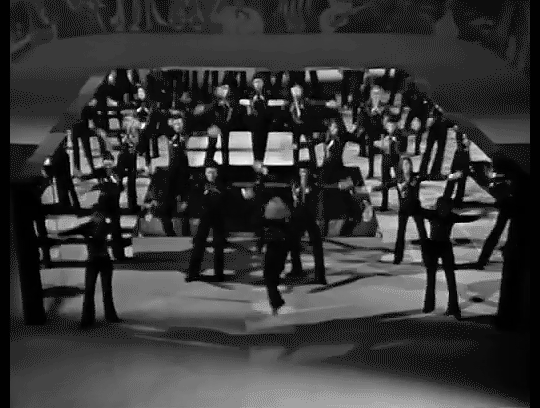
“Prisencolinensinainciusol”
Performance by Raffaella Carrà & Adriano Celentano on Radiotelevisione italiana, 1974
#prisencolinensinainciusol#raffaella carra#dance#adriano celentano#70s#raffaella carrà#italy#70s fashion#1970s#gif#vintage#black and white#variety show#dancing#italian tv#cinemapix#tvandfilm#filmtvdaily#retrotvblr#retrotvedit#dailyflicks#dailytvfilmgifs#televisionedit#tvedit#televisongifs#retro tv#1970s fashion#radiotelevisione italiana#italiano#(alright!)
100 notes
·
View notes
Text
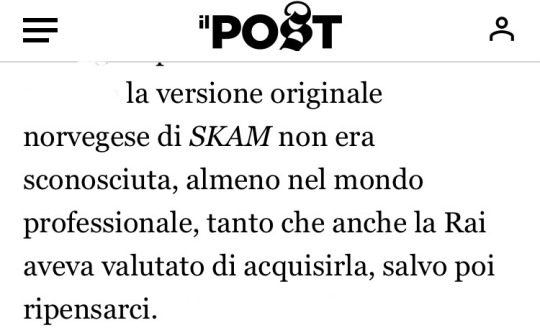
Gli incubi che mi vengono se penso a Skam adattata dalla Rai
#soprattutto la Rai del 2017#scritta da quelli che hanno partorito quel capolavoro della seconda stagione di un profe#un professore#no madonna non ci voglio pensare#abbiamo schivato un proiettile amic*#italian robe#rai#radiotelevisione italiana#impara da#Ludovico bessegato amica Rai#skam Italia
22 notes
·
View notes
Text
“ All’atto di redigere il testo di un parlato radiofonico si dovrà dunque evitare in ogni modo che nel radioascoltatore si manifesti il cosiddetto «complesso di inferiorità culturale», cioè quello stato di ansia, di irritazione, di dispetto che coglie chiunque si senta condannare come ignorante dalla consapevolezza, dalla finezza, dalla sapienza altrui. Questo «complesso» determina una soluzione di continuità nel colloquio tra il dicitore e l’ascoltatore, crea una zona di vuoto, un «fading» spirituale nella recezione. Ad ovviare la qual calamità radiofonica è in particolare consigliabile:
a) in ogni evenienza astenersi dall’uso della prima persona singolare «io». Il pronome «io» ha carattere esibitivo, autobiografante o addirittura indiscreto. Sostituire all’«io» il «noi» di timbro resocontisticoneutro, o evitare l’autocitazione. Al giudizio: «Io penso che la Divina Commedia sia l’opera maggiore di Dante», sostituire: «La Divina Commedia è ecc.»;
b) astenersi da parole o da locuzioni straniere quando se ne possa praticare l’equivalente italiano. Usare la voce straniera soltanto ove essa esprima una idea, una gradazione di concetto, non per anco trasferita in italiano. Per tal norma inferiority-complex, nuance, Blitz-Krieg e chaise-longue dovranno essere sostituiti da complesso d’inferiorità, sfumatura, guerra lampo e sedia a sdraio: mentre self-made man, Stimmung, Weltanschauung, romancero, cul-de-lampe e cocktail party potranno essere tollerati;
c) evitare gli sterili elenchi dei nomi di persona quando non si possono caratterizzare o comunque definire le persone chiamate in causa. Meglio omettere dei «nomi da manuale», che infastidire l’ascoltatore citando nomi destinati a spegnersi appena pronunziati, come faville lasciate addietro per un attimo dalla corsa d’una locomotiva;
d) operare analogamente con le date. In un esposto di carattere storico le date costituiscono opportuno ammonimento, gradito appoggio e gradita eccitazione per la memoria. Tali appaiono al viaggiatore le indicazioni chilometriche. Delle date si dovrà misurare il valore e l’intercorrenza più conveniente. Si dovranno gerarchizzare, distanziare le une dalle altre; e porgerle comunque con garbo all’attenzione di chi ascolta, quasi le richiedesse opportunità, necessità;
e) astenersi dal presupporre nel radioabbonato conoscenze che «egli», il «qualunque», non può avere e non ha. Inibirsi la civetteria del dare per comunemente noto quello che noto comunemente non è. A nessun uomo, per quanto colto, si può chieder di essere una enciclopedia. I lemmi dell’enciclopedia rappresentano la fatica di migliaia di collaboratori;
f) entrare subito o pressoché subito in medias res: non tener sospeso l’animo del radioascoltatore con lunghi preamboli, con la vacuità di premonizioni superflue che il valore cioè il costo del tempo radioparlato sono ben lontani dal giustificare, dall’ammettere. “
Carlo Emilio Gadda, Norme per la redazione di un testo radiofonico.
NOTA: durante la sua collaborazione con la RAI (accettata per necessità e mal sopportata), presso i servizi di cultura del Terzo programma (1950-55), Gadda redasse un breve vademecum a beneficio degli autori radiofonici e destinato a circolazione interna (veniva allegato ai contratti per i collaboratori). La prima edizione delle Norme (ERI, Torino, 1953) apparve senza il nome dell’autore ma firmata in calce «IL TERZO PROGRAMMA»; seguì una seconda edizione (ERI, Torino, 1973), questa volta a nome di Gadda. Il testo fu quindi accolto nelle raccolte postume degli scritti minori dell’ «ingegnere».
#Carlo Emilio Gadda#radio pubblica#linguaggio#mass media#complesso di inferiorità culturale#letture#leggere#parlare#intellettuali italiani del XX secolo#barbarismi#comunicazione#Storia della lingua italiana#scrittori lombardi#codici linguistici#Radiotelevisione italiana#RAI#citazioni#società italiana#Unità linguistica italiana#italiano standard#anni '50#cultura#Terzo programma#autori radiofonici#vademecum#lingue#manuali d'istruzione#Torino#neologismi#conservatorismo
29 notes
·
View notes
Photo
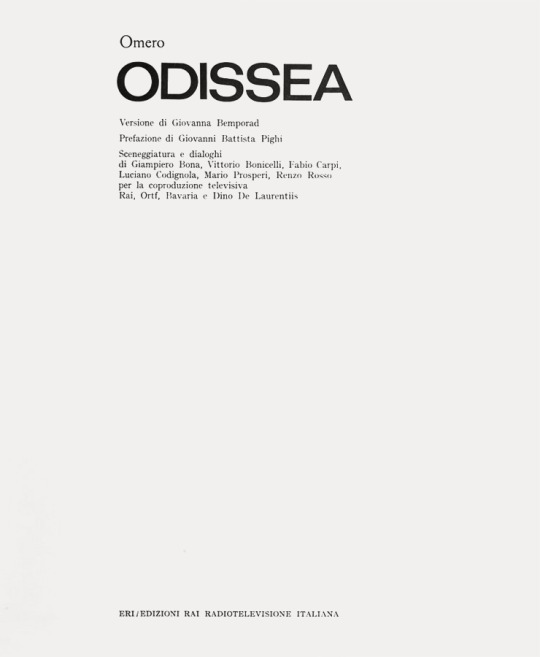
From: Omero, Odissea, Translation by Giovanna Bemporad, Foreword by Giovanni Battista Pighi, ERI Edizioni Rai Radiotelevisione Italiana, Torino, 1968 [Fondo Giovanna Bemporad, Centro Apice (Archivi della Parola, dell'Immagine e della Comunicazione Editoriale), Università degli studi di Milano, Milano]
#graphic design#poetry#omero#homerus#giovanna bemporad#giovanni battista pighi#eri#edizioni rai radiotelevisione italiana#fondo giovanna bemporad#centro apice#1960s
24 notes
·
View notes
Text
Le Chant du départ
Étienne-Nicolas Méhul (1763 - 1817): Le Chant du départ (originariamente Hymne de la liberté) per voci soliste, coro e orchestra (1794) su testo di Marie-Joseph Chénier (1764 - 1811). Versione con orchestra di strumenti a fiato e timpani: Antonella Balducci, soprano; Dennis Hall, baritono; Coro e Orchestra della Radiotelevisione della Svizzera italiana, dir. Herbert Handt.
Le Chant du départ…
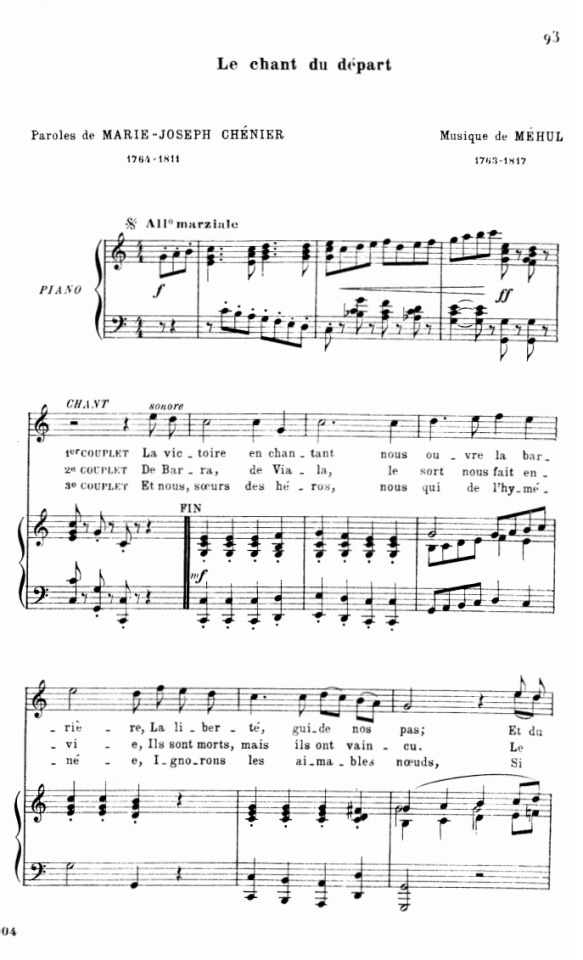
View On WordPress
#Antonella Balducci#Étienne-Nicolas Méhul#Coro della Radiotelevisione della Svizzera italiana#Dennis Hall#Herbert Handt#Marie-Joseph Chénier#Orchestra della Radiotelevisione della Svizzera italiana#Quatorze Juillet
0 notes
Text
Produzioni Rai essere piace:
giallo/thriller con lead femminile forte e indipendente™
Serie prodotte in osservanza ai patti lateranensi
Napoli
1 note
·
View note
Text
Ti ringrazio RAI radiotelevisione italiana per questa nuovissima serie tv su bellocci che lavorano per la camorra, molto felice che finalmente venga data una rappresentazione originale e mai vista prima dei quartieri più poveri d'Italia, per la prossima innovativa serie suggerisco una suora che gira in monopattino per le vie di Terni e nel tempo libero risolve crimini
90 notes
·
View notes
Text
as a bisexual person myself, that's exactly the kind of representation I want and deserve: a cute blue-eyed Neapolitan criminal who's never had a single thought in his entire life. die mad about it, Rai – Radiotelevisione Italiana
#un professore#rai#fiction#nicolas maupas#damiano gavino#domenico cuomo#alessandro gassman#simuel#mimmone#bisexuality
154 notes
·
View notes
Text
There are pits I've always believed I'd be capable of avoiding. Getting involved into the relationship of Simone sottone per i malamente Balestra and Mimmo carcerato per bene Bruni by one RAI radiotelevisione italiana was one of those.
And yet here I am. Involved.
How far have I fallen
7 notes
·
View notes
Text
Rosella: Rose in Bloom’s Italian Adaptation
Back in August of 2022 when I was doing Alcott Adaptation August (a month where I watched and reviewed every single adaptation of Little Women that I could reasonably find; still need to finish my reviews of 2019 and 1978), I was scouring IMDb for anything that Louisa May Alcott had a writing credit on. I found something really surprising: A 1964 Italian TV mini series called Rosella. Could this be an adaptation of my favorite underappreciated Louisa May Alcott novel, Rose in Bloom? Naturally, I had to know more.
The IMBd page tells us very little. In addition to Louisa May Alcott, there is one other writing credit, Anna Maria Romagnoli, who wrote the screenplay. Then we have a director, Lelio Golletti. It was produced and distributed by RAI Radiotelevisione Italiana and filmed in black and white. Finally, we have a cast list: Rosella is played by Laura Efrikian, Marco is played by Enzo Cerusico, Carlo is played by Marino Masé, Stephano is played by Vittorio Mezzogiorno, Febe is played by Angela Cavo, Zia Clara is played by Loredana Savelli, Arci is played by Paolo Modugno, Giacomino is played by Marco Paolini, Zia Myra is played by Anna Maria Ackermann, Debora is played by Vittoria Di Silverio, Zia Jessica is played by Delia Valle, Zia Pace is played by Donatella Gemmò, Zio Frank is played by Gerardo Panipucci, and Dottore is played by Carlo Lombardi. Based on my nonexistent Italian, I would guess that Rosella is Rose, Marco is Mac, Carlo is Charlie, Stephano is Steve, Febe is Phebe, Arci is Archie, Zia Clara is Aunt Clara, Zia Myra is Aunt Myra, Zia Jessica is Aunt Jessie, Zia Pace is Aunt Peace (who might have been combined with Aunt Plenty to make the cast more manageable?), Debora is the cook who is sometimes called Debby and sometimes called Dolly in Eight Cousins, and Zio Frank must be one of the uncles, though it’s unclear which one. However, I was stumped by Giacomino and Dottore.
The wonderful @thatscarletflycatcher offered to do some research for me as she’s a Spanish speaker, which is a lot closer to Italian than I am, and she managed to find some promo images with captions that she translated for me. I’m including them below the cut since there are some pretty big spoilers.
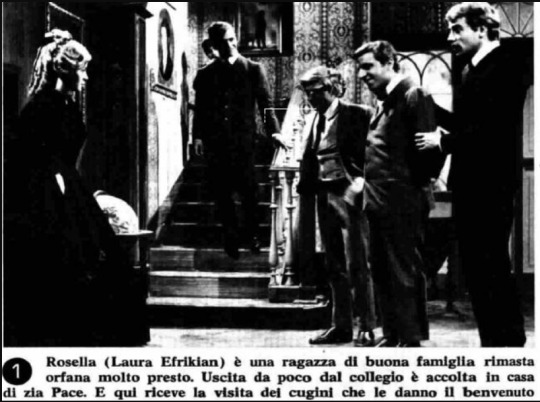
Rose (Laura Efrikian) is a girl from a good family that became an orphan early in life. She is taken away from school and received in the home of Aunt Peace. It is there that she receives the visit of her cousins that give her a welcome.
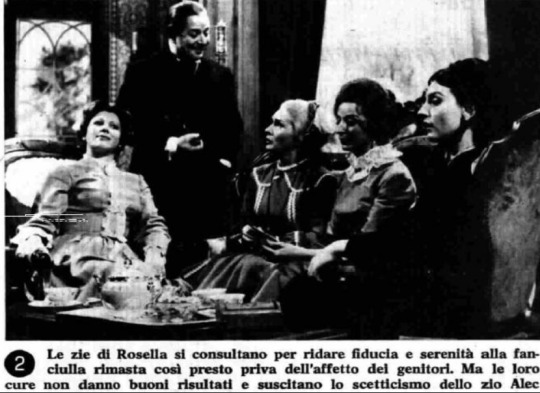
Rose’s aunts consult with each other to restore confidence and serenity to the girl left so soon deprived from the affection of her parents. But their cures don't give good results and raise the skepticism of Uncle Alec.
According to this, there is a “zio Alec” who was not listed on the cast list. Which means that Zio Frank can’t be Uncle Alec. My guess would be that he’s Uncle Mac, but I’m not sure.
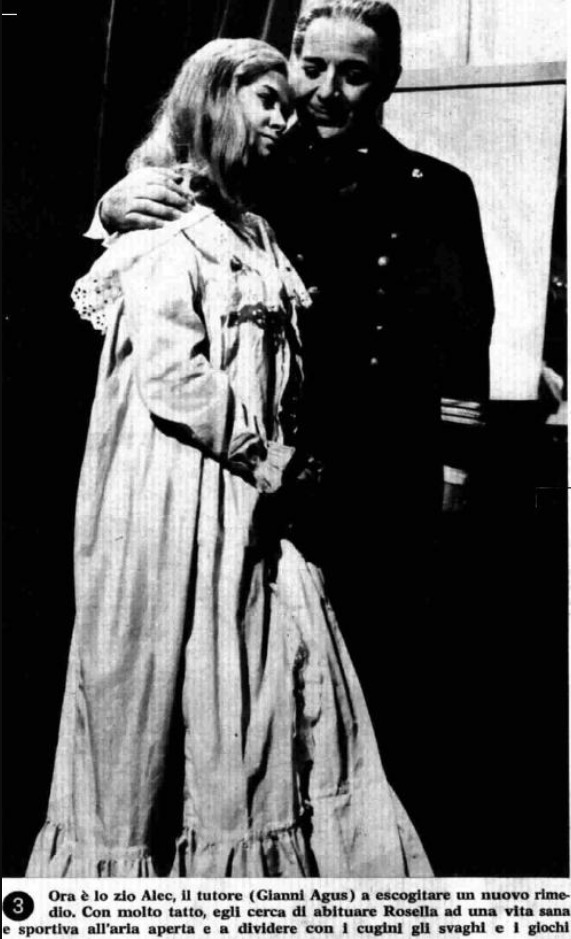
Now it is Uncle Alec, her guardian (Gianni Agus), who thinks of another remedy. With a lot of tact, he tries to accustom Rose to a sporty and healthy life in the open air and to share joys and sorrows with her cousins.
So, here we have proof that Uncle Alec was not on the cast list and also that he was played by Gianni Agus.
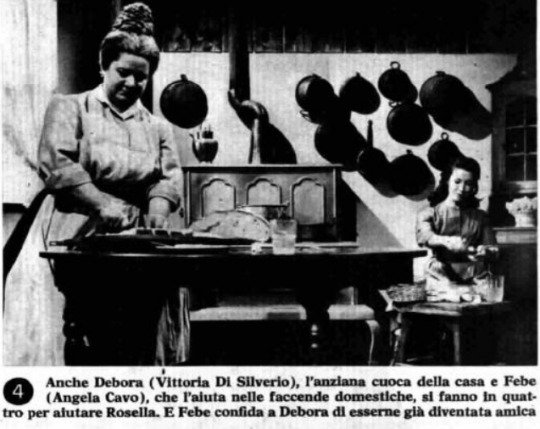
Even Deborah (Vittoria Di Silverio), the old cook of the house, and Phebe (Angela Cavo), who helps her with the domestic chores, get together to help Rose, and Phebe confides to Deborah that they have already become friends.
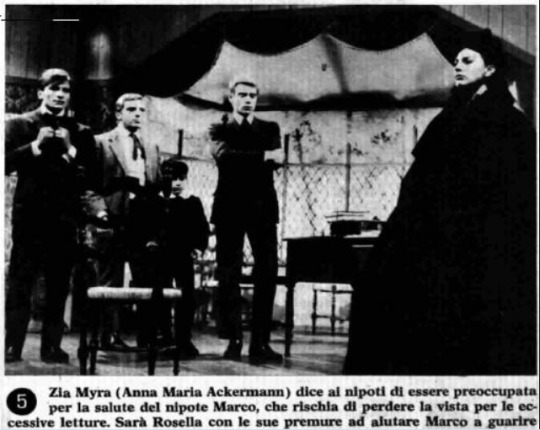
Aunt Myra (Anna Maria Ackermann) tells her nephews that she's worried about the health of her nephew Mac, who risks losing his eyesight from reading too much. It will be Rose with her thoughtfulness the one to help Mac.
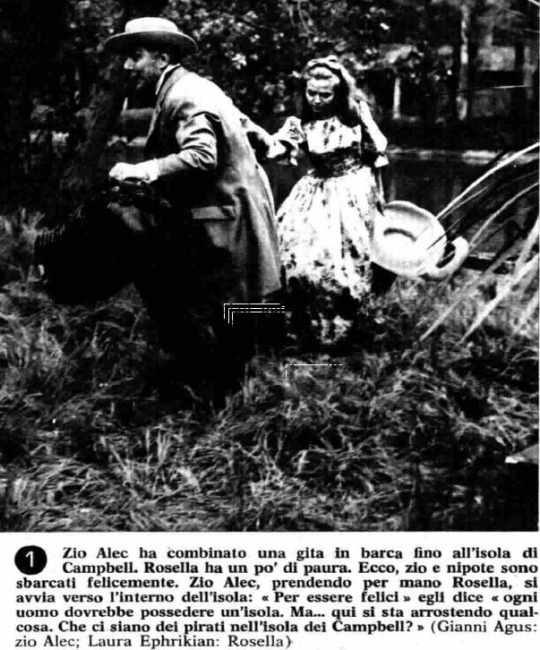
Uncle Alec has prepared a ship trip to Campbell’s Island. Rose is a bit afraid. Then, uncle and niece reach land happily. Uncle Alec, taking Rose's hand, walks onto the island. "To be happy," he says, "each man must have an island. But... there's someone roasting something over there. Who are the pirates on Campbell’s island?" (Gianni Augus: Uncle Alec; Laura Ephrikian: Rose)
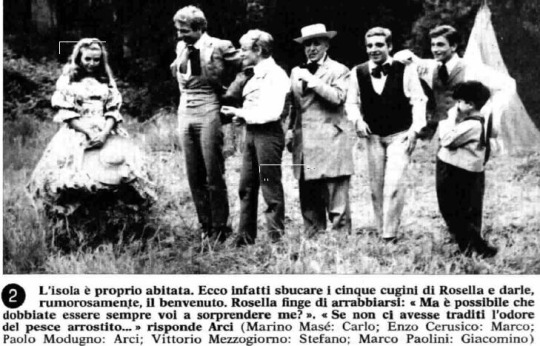
The island is, in fact, inhabited. Then in fact Rose's five cousins appear to give her, noisily, a welcome. Rose pretends to be angry: "Is it possible that it must always be you the ones to surprise me?"
"If only the smell of the roasting fish had not betrayed is..." Archie answers. (Marino Masé: Charlie; Enzo Cerusico: Mac; Paolo Modugno: Archie; Vittorio Mezzogiorno: Steve; Marco Paolini: Jamie)
This caption gives us confirmation that the cast has been condensed to some degree. Rose now has five cousins instead of seven. (The cuts are, of course, Will and Geordie, which is the correct choice since they have no narrative function except to add some extra numbers.) I’m also now pretty sure that Giacomino is Jamie.
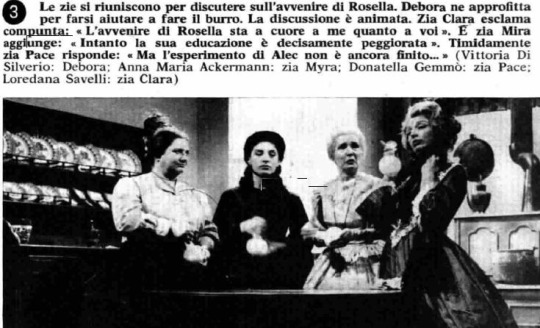
The aunts get together to discuss Rose's future. Deborah takes the opportunity to get help making butter. The discussion is lively. Aunt Clara exclaims, moved: "Rose's future is as dear to me as it is to you."
And Aunt Myra adds: "In the meantime, her education has decidedly worsened."
Timidly, Aunt Peace replies "But Alec's experiment isn't over yet..." (Vittoria Di Silverio: Deborah; Anna Maria Ackermann: Aunt Myra; Donatella Gemmò: Aunt Peace; Loredana Savelli: Aunt Clara)
The fact that Aunt Myra seems to be rather concerned with education makes me think that the Aunt Myra of Rosella may be a combination between the Aunt Myra of the book and Aunt Jane, just as the Aunt Peace of Rosella seems to be a combination of the Aunt Peace of the book and Aunt Plenty.

Rose has found her cousins Archie and Charlie smoking. She's scandalized: "It is bad for your health, and you don't like it, so why do you keep doing it?"
"Why shouldn't we?" Charlie answers fast.
"It is for the sake of your health that I say it to you," Rose replies, "and to please me."
To which Charlie retorts, "Would you give up your earrings if we gave up our cigarettes?"
Archie wavers a little. "Don't be cruel! You know how much she cares!" he tells his cousin.
But Rose has not a single moment of doubt: "I care more about you than about my earrings. I accept the deal."
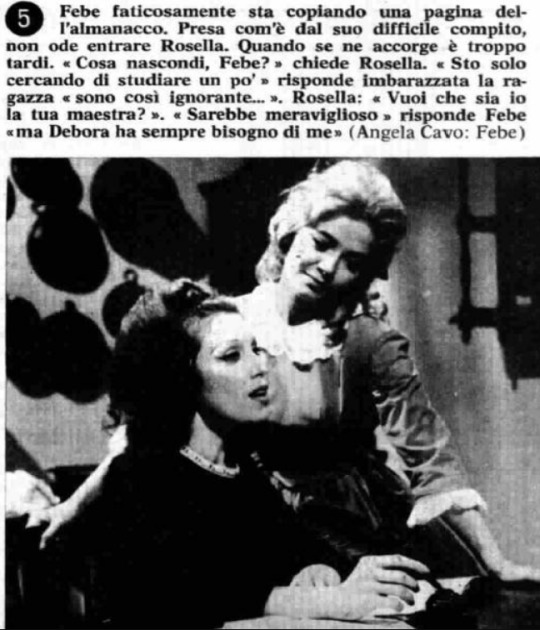
Phebe tirelessly copies a page from the almanac. Caught as she is in her difficult task, she doesn't hear Rose enter the room. When she realizes it, it's already too late. "What are you hiding, Phebe?" Rose asks.
"I am just trying to study a little," the girl answers embarrassed. "I am so ignorant".
Rose: "Would you like me to be your teacher?"
"That would be marvelous!" Phebe replies. "But Deborah always needs me."
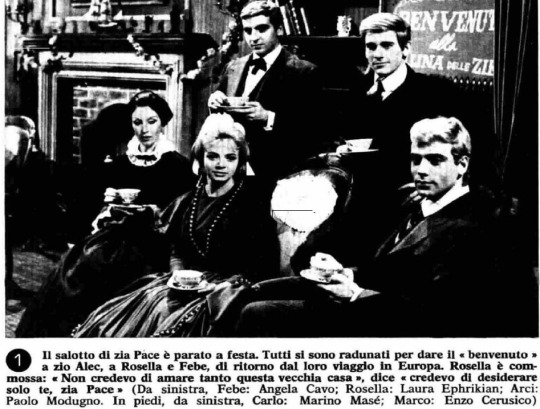
The greeting of Aunt Peace has turned into a party. They have gathered together to give their welcome to Uncle Alec, Rose, and Phebe as they come back from their trip to Europe. Rose is moved: "I cannot believe I love this house so much," she says. "I think I only want you, Aunt Peace." (From the left, Phebe: Angelia Cavo; Rose: Laura Ephrikian; Archie: Paolo Modungno. Standing, from the left, Charlie: Marino Masé; Mac: Enzo Cerusico)

Phebe, sitting at the pianoforte, sings an old folk song. Archie listens to her enraptured. When the song ends, Charlie and Mac applaud vigorously. Only Archie remains in the same fixed position he was at the beginning of the song. Phebe stands up confused and happy.
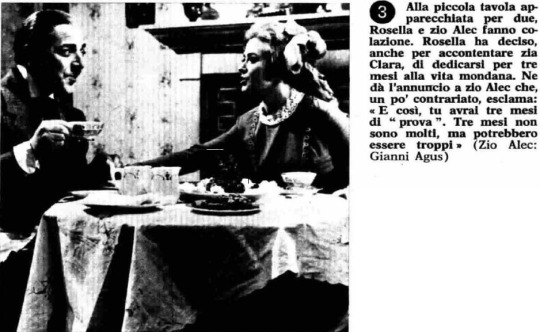
At the small table prepared for two, Rose and Uncle Alec have a meal. Rose has decided, to make Aunt Clara happy, to dedicate herself for three months to a worldly life. She tells this news to Uncle Alec, who, a bit shocked, exclaims: "And so, you will have three months of trial. Three months are not much, but they can be just enough." (Uncle Alec: Gianni Agus)
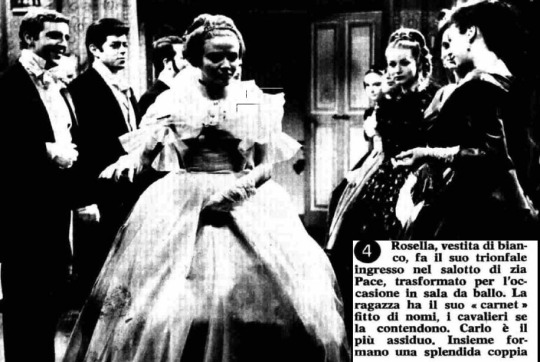
Rose, dressed in white, makes her triumphal entrance into Aunt Peace's drawing room, which has been turned into a ballroom for the occasion. The girl has her "card" filled with names, and the gentlemen fight over her. Charlie is the most insistent, and they form an splendid couple indeed.
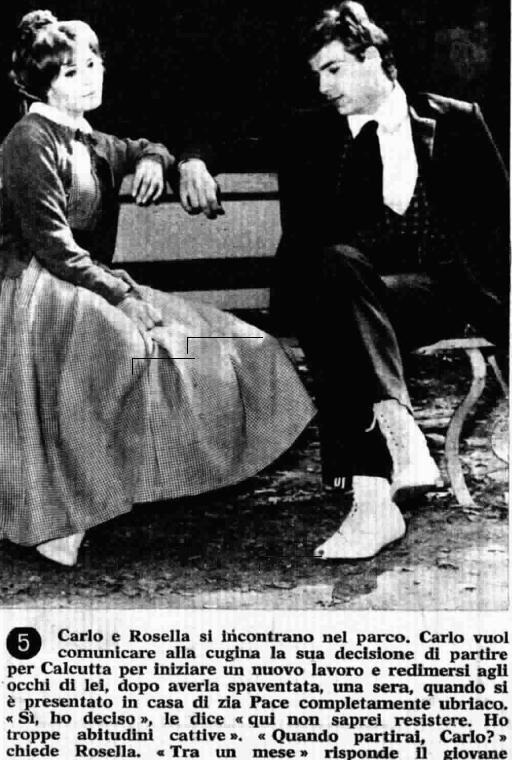
Charlie and Rose meet at the park. Charlie wants to communicate to his cousin his decision to depart for Calcutta to start a new business and redeem himself in her eyes, after having frightened her, one evening, when he showed up at Aunt Peace's house completely drunk. "Yes, I'm determined," he says. "I cannot resist. I have too many bad habits."
"When will you go, Charlie?" Rose asks.
"In a month," the youth answered.
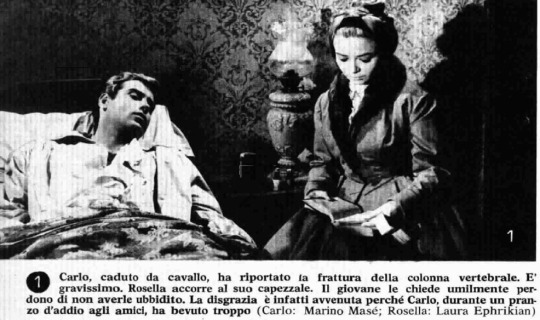
Charlie, having fallen off a horse, has suffered a spinal injury. He's in a very grave condition, and Rose runs to his bedside. The young man asks her humbly to forgive him for having disobeyed her. The disgrace did indeed happen because Charlie, during a goodbye lunch with his friends, had drunk a lot. (Charlie: Marino Masé; Rose: Laura Ephrikian)
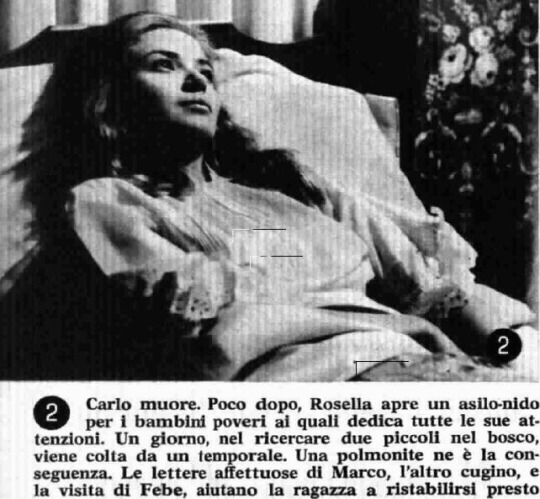
Charlie dies. A little later, Rose opens an orphanage for poor children to which she devotes her full attention. One day, searching after two little ones in the forest, she's caught in a storm. Pneumonia is the consequence. The affectionate letters from Mac, her other cousin, and the visit of Phebe, help the girl recover fast.
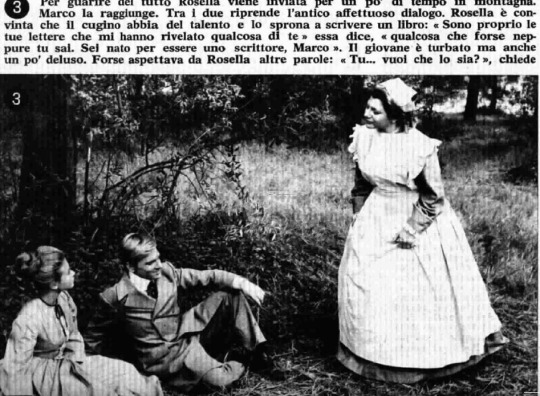
To completely recover, Rose is invited to spend some time on the mountains. Mac joins her. The affectionate conversation is rekindled between the two. Rose is persuaded that her cousin has talent, and motivates him to write a book. "Your very letters were the ones that have revealed something about you to me," she says, "something that perhaps you yourself don't even know. You were born to be a writer, Mac."
The young man is moved but a little disappointed. He rather expected from Rose different words. "Do you want me to?" he asked.
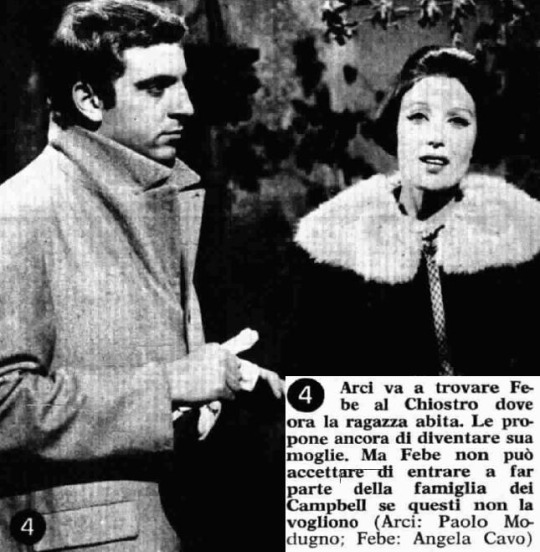
Archie goes to pick Phebe up at the convent where the girl now lives. He proposes marriage to her, but Phebe cannot accept becoming part of the Campbell family if they don't want her. (Archie: Paolo Modugno; Phebe: Angela Cavo)
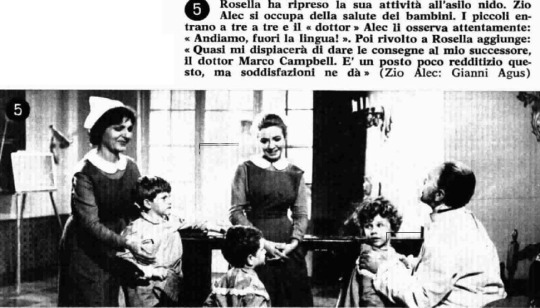
Rose has restarted her activities at the orphanage. Uncle Alec is in charge of the healthcare of the children. The little ones enter three-by-three, and doctor Alec studies them attentively: "Come on, tongue out!" And turning to Rose he adds: "It will almost be disagreeable to me to give this job to my successor, Dr. Mac Campbell. It is not a very profitable one, this position, but it brings a lot of satisfaction." (Uncle Alec: Gianni Agus)
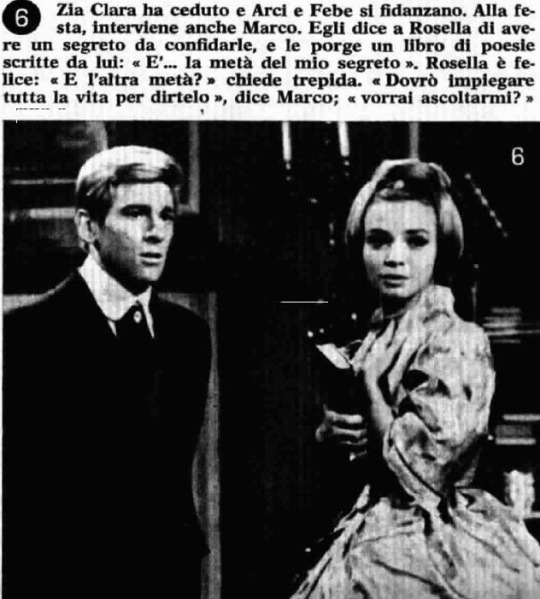
Aunt Clara has conceded, and Archie and Phebe get engaged. During the party, Mac intervenes. He tells Rose that he has a secret to tell her, and he gives her a poetry book he wrote. "This is half of my secret." Rose is happy. "And the other half?" She asks trembling. "I will have to employ my whole life in telling it to you," Mac says. "Would you like to hear it?"
I’m not sure if this is meant to imply that Archie is Aunt Clara’s son in this version or just that she was the biggest objector to Phebe marrying in and with her acceptance, there was no one among the Campbells who was still against their marriage.
From these screenshots and descriptions, it would seem that the adaptation covers events from both Eight Cousins and Rose in Bloom. Otherwise, there are still many things that are mysterious about it. I’m still not sure which uncle “zio Frank” is supposed to be, and I have no idea who Dottore is. Neither Scarlet or I have been able to find out if this adaptation still exists somewhere or if it’s lost media. Scarlet kindly wrote an email on my behalf (since my Italian remains nonexistent) to the company that made and distributed the adaptation to try and figure this out, but thus far she’s been passed between email addresses for different people and departments and we don’t seem to be any closer to an answer.
Still, if this is the only information we ever get about this adaptation, it still makes me happy to know that it at one point did exist. Perhaps there’s some 90-year-old Italian woman who tuned into the slot that ran Rosella, TV Dei Ragazzi (the TV of children), in 1964 and fell in love with the characters and story just as much as I did. I will never meet this Italian woman, and even if we did, we wouldn’t be able to communicate unless she had learned English at some point, but it’s cool to think how the same story can touch people all around the world. They may never know each other, but for at least one moment, their hearts are connected throughout time and space.
And personally, I think that’s pretty cool.
#Louisa May Alcott#Rose in Bloom#Eight Cousins#Rosella#Adaptations#Mac Campbell#Rose Campbell#Archie Campbell#Phebe Moore#Steve Campbell#Uncle Alec#Aunt Myra#Aunt Peace#Aunt Jessie#Aunt Clara#Jamie Campbell#And whoever Zio Frank and Dottore are.
27 notes
·
View notes
Photo

RAI
RadioTelevisione Italiana
10 notes
·
View notes
Note
Dottor Bicheco, la sfido.
Riesce a scrivere un racconto usando queste 5 parole:
Geolier, Mango, rai, razzismo, Sanremo.
Buon lavoro.
Le ask che piacciono a me. 😄
Dei soldati marciano verso il piazzale della Rai Radiotelevisione italiana. In mezzo a loro c'è qualcuno dal volto coperto. Giunti davanti a Viale Mazzini l'uomo viene legato al cavallo e liberato dal cappuccio: è Geolier! L'esercito si schiera di fronte al rapper per quella che sembra essere una vera e propria fucilazione. "Geolier, il momento è giunto" a parlare è il capo dell'esercito, "tu e i tuoi concittadini avete accusato Mamma Rai, il Festival di Sanremo e persino l'immarcescibile Amadeus di razzismo. Un'accusa ingiusta, infamante ed inaccettabile! Adesso però hai la possibilità di salvarti oppure dovrai pagare il prezzo delle tue malefatte. Dipende solo da te, da come risponderai a questa domanda: Geolier.... sei pentito e chiedi scusa per le tue affermazioni contro le sacre istituzioni del nostro bel paese?". Geolier guarda verso il cielo, abbozza un timido sorriso, sembra accennare un "sì" con la testa, e poi serissimo: "Mango po cazz!!!".
Così muore un napoletano.
5 notes
·
View notes
Text
Raga stanno inquadrando una bandiera della Palestina. Con accanto scritto stop genocide. Su Rai 1. Alle 23:36. In my Rai radiotelevisione italiana??
13 notes
·
View notes
Text
Signore e signori, la Rai Radiotelevisione Italiana
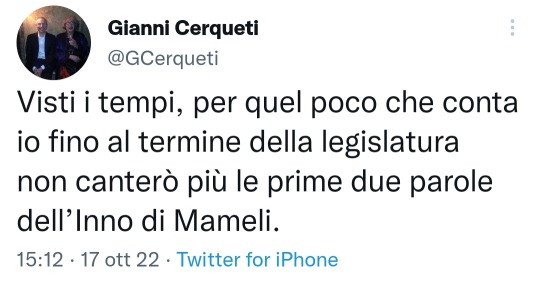
48 notes
·
View notes
Photo
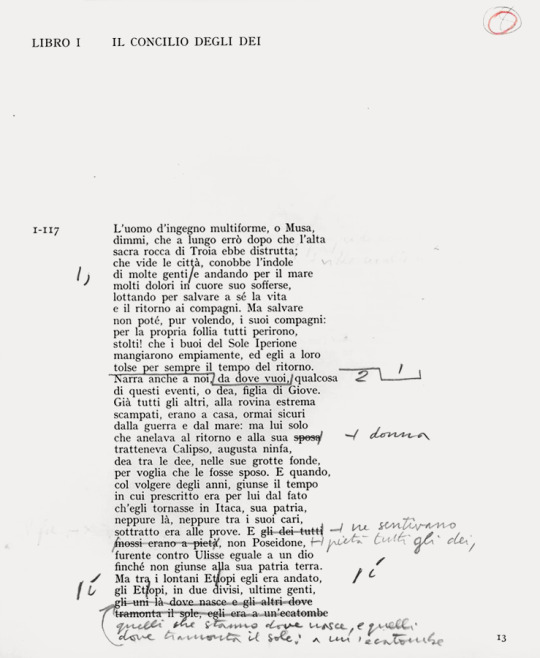
From: Omero, Odissea, versione di Giovanna Bemporad, (draft), Foreword by Giovanni Battista Pighi, ERI Edizioni Rai Radiotelevisione Italiana, Torino, 1968 [Fondo Giovanna Bemporad, Centro Apice (Archivi della Parola, dell'Immagine e della Comunicazione Editoriale), Università degli studi di Milano, Milano]
#graphic design#poetry#notation#handwriting#book#omero#homerus#giovanna bemporad#giovanni battista pighi#eri#edizioni rai radiotelevisione italiana#fondo giovanna bemporad#centro apice#1960s
21 notes
·
View notes
Text
Suite fiabesca
Lino Liviabella (7 aprile 1902 - 1964): Suite fiabesca per orchestra da camera (1948). Orchestra della Radiotelevisione della Svizzera italiana, dir. Otmar Nussio (registrazione del 1963).
La favola gioconda
La favola triste [3:07]
Girotondo [7:41]
Il trombettiere [9:33]
Sinfonia [11:14]
youtube
View On WordPress
0 notes